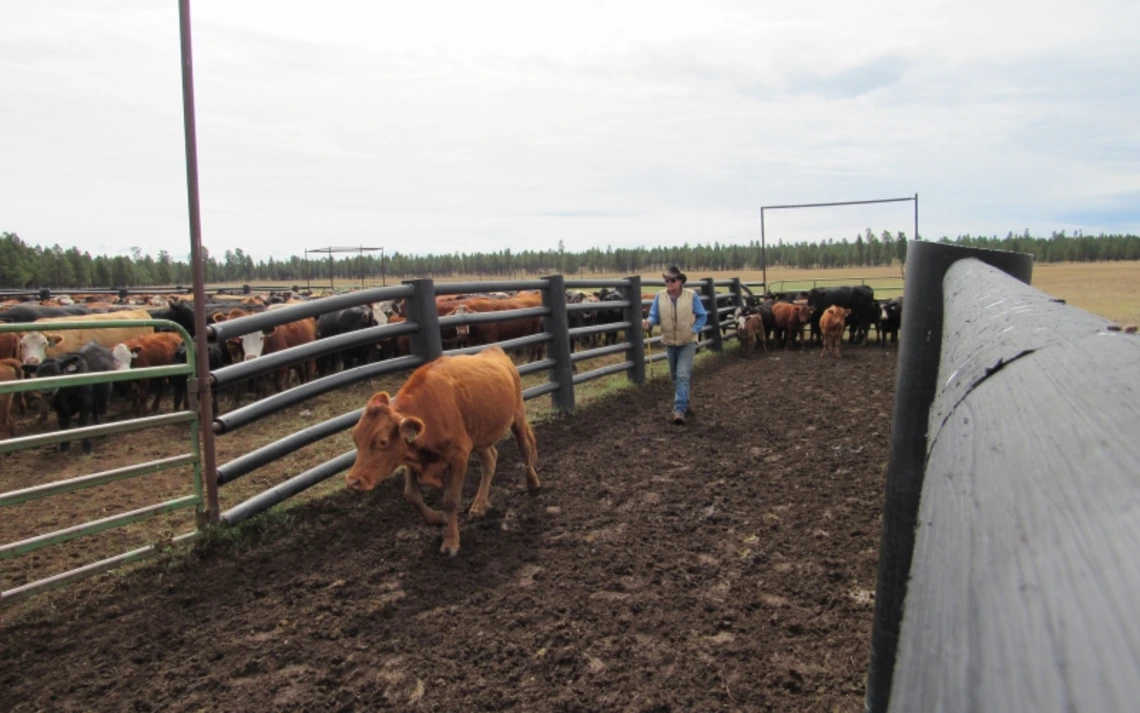University of Arizona Beef Herd Undergoes Comprehensive Genetic Testing

The University of Arizona now has one of the most complete descriptions of genome variance of any academic beef herd in the world after completing single nucleotide polymorphism typing in May at the V Bar V Agricultural Experiment Station in Coconino County.
Single nucleotide polymorphisms, or SNPs, in genomes affect an infinite number of traits, including milk production, feed efficiency, disease resistance, animal stress, heat and low water tolerance, calving ease, and low versus high methane production.
The goal is to use the extensive data, which is being stored by the Experiment Station's Communications and Cyber Technologies department, to help cattle growers improve production by identifying predictable and specific genetic traits in cows.
"We're doing what land-grant universities are supposed to do – research that doesn't just get published but is proactively getting into our local economies," said Shane Burgess, vice president of Agriculture, Life and Veterinary Sciences, and Cooperative Extension.
While the technology has been fully adopted by the dairy industry for the better part of a decade and is commercially available, the expense can be prohibitive.
Burgess and Mitch McClaran, associate director of the Experiment Station Strategy, decided to SNP type the herd to make the data available not only to faculty for research, but to anyone worldwide to enable them to identify how to improve beef cattle production and welfare.
"Progressive Arizona ranchers are integrating it as best they dare, but it's the University of Arizona's job to test the limits and take breeding risks that they cannot rationally take in the private sector," Burgess said. "The worst that happens if we take a low probability, but high return, breeding approach and our hypothesis is wrong, is we start again next year. For a private rancher, they go broke."
Jay Whetten, immediate past president of the Arizona Cattle Growers Association, said much genetic research and work has been done within the cattle industry on traits like beef quality and marbling, but "in the process we have lost some good things that cattle had before," like finding cattle that do better on less forage or will graze farther from a water source.
"The stuff that the University of Arizona is doing up there is really neat, and we need to get more studies done on these areas," Whetten said. "That's the bottom line. We need more kinds of tests that allow us to be more efficient, but at the same time continue a quality line."
The SNP-type profile used by the University of Arizona generates 770,000 unique lines of data for each cow, which are associated with a change in how the animal looks, works physiologically and behaves. It is a huge amount of information for anyone to manage, and the university's project will allow cattle growers to access the research findings without investing their own time and money.
"This is a powerful tool for identification when compared with other methods," said Patricia Stock, director of the School of Animal and Comparative Biomedical Sciences in the College of Agriculture and Life Sciences.
V Bar V superintendent Keith "Bopper" Cannon, who conducted the SNP typing on the university's herd of 445 cattle, is glad to see SNP typing being utilized as another tool for ranchers to make their businesses more efficient and profitable.
"It's just a new way, that's what I try to tell everybody," Cannon said. "The old way – the way grandpa and dad did it – that got us to where we are today, but this technology is going to take us into the future. That's important because we've got do more with our animals to feed more people."

